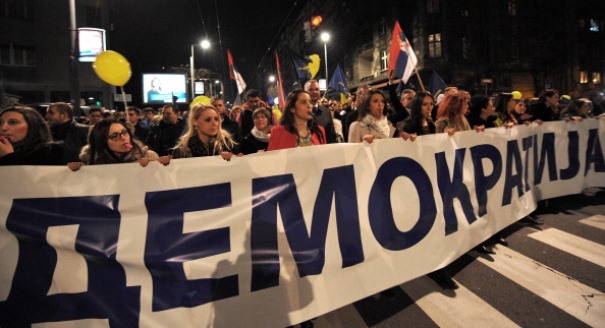The Western Balkans are not in good shape. Two decades after the war in Bosnia and Herzegovina and sixteen years after the war in Kosovo, democracy, the rule of law, and press freedom have been slow to take root.
This is despite the enormous amount of financial assistance that the European Union has disbursed throughout the region.
It is also despite the promise that one day these countries—Albania, Bosnia and Herzegovina, Kosovo, Macedonia, Montenegro, and Serbia—would become EU members. The prospect of EU membership used to be the spur for reforms and the democratization of these states’ societies.
Combined, this concoction not only leads to growing unemployment and a disaffected younger generation. It also undermines the gains made over the years in trying to consolidate the difficult transition to democracy in this part of Europe. Surely the EU is aware of these negative developments. And if so, what is it doing to address them?
Take the gradual erosion of press freedom. A recent report on the state of the media in Bosnia and Herzegovina, Macedonia, and Serbia shows all too clearly how journalists are being intimidated and harassed when they write about political and economic corruption.
The report, published in March by the European Fund for the Balkans, argues that the authorities in most of these countries interfere more and more in editorial content. The European Fund for the Balkans is a joint initiative of several European foundations engaged in working with civil society and promoting democracy in the Balkans. The organizations involved consist of the Robert Bosch Stiftung, the King Baudouin Foundation, the Compagnia di San Paolo, and the ERSTE Foundation.
Since the state sector still plays a substantial role in the Balkan economies, its influence over the media is considerable. It is often one of the principal sources of advertising revenue for newspapers. This nexus between politics, state enterprises, and the public sector encourages the scope for state interference in the media. Newspapers are beholden to the state for advertising.
The prospect of EU membership used to be the spur for reforms in the #Balkans.Tweet This
“In a situation where electoral politics is often fiercely competitive but the rule of law incomplete, the temptation is great for those in power, or those seeking power, to pressure the media in pursuit of their political agendas,” the fund’s report states.
The report is highly critical of how Serbia, an EU candidate country, is clamping down on the media, particularly Balkan Insight, a publication of the Balkan Investigative Reporting Network (BIRN). An independent organization, BIRN has been monitoring governance and the judiciary and training journalists in the region.
BIRN recently investigated how the Serbian power company Elektroprivreda Srbije had awarded a contract to repair the state-owned Tamnava mine to a consortium of two companies with no relevant experience. One of the directors is standing trial for tax evasion. Aleksandar Vučić, the Serbian prime minister, called the authors of the BIRN investigation “liars,” saying they “got the money from Mr. [Michael] Davenport,” head of the EU delegation in Belgrade, “to speak against the Serbian government.”
According to the report by the European Fund for the Balkans, “there are clear authoritarian tendencies in the current government that find their most tangible expression in the instrumentalisation of the media and in relentless attacks on those who persist in reporting things as they are.”
The situation in neighboring Bosnia and Herzegovina, never rosy for the media, is deteriorating too. The offices of InterSoft, an Internet company that owns Klix.ba, a popular news portal, were recently raided by the authorities in Republika Srpska, one of the two entities that make up Bosnia and Herzegovina. Klix.ba had allegedly uncovered a bribery scandal at the highest political level.
In addition, Bosnia and Herzegovina now has a new law on public peace and order. The legislation criminalizes social media postings that allegedly disturb public order or contain indecent, offensive, or insulting content. The law has “raised fears that the authorities might in the future seek to clamp down on online expression such as Tweets or Facebook posts,” the report adds.
Gruevski has turned #Macedonia from a promising democracy into one based on populism and corruption.Tweet This
In nearby Macedonia, press freedom and governance deteriorate by the week. Since 2006, the nationalist VMRO-DPMNE party has governed Macedonia, with Nikola Gruevski as prime minister. During this time, Gruevski has turned the republic from a once-promising democracy into one based on populism and corruption, according to civil society organizations.
In February, Macedonia’s opposition Social Democrats accused Gruevski and Sasho Mijalkov, head of the country’s secret police, of orchestrating the illegal surveillance of more than 20,000 people over at least four years. PEN International, a worldwide association of writers, has also condemned reports of unauthorized surveillance and pressure on the media.
The EU is far from blameless. BIRN, the European Fund for the Balkans, and other foundations want Johannes Hahn, the European enlargement commissioner, and the European External Action Service to be much more critical and open about what is happening to the media in the region.
Their reluctance to do so disappoints a younger generation of journalists who need the EU to defend a principle that, after all, the EU has made one of its core values. Failing that, neither the democratization nor the stability of Europe’s backyard can be taken for granted.








